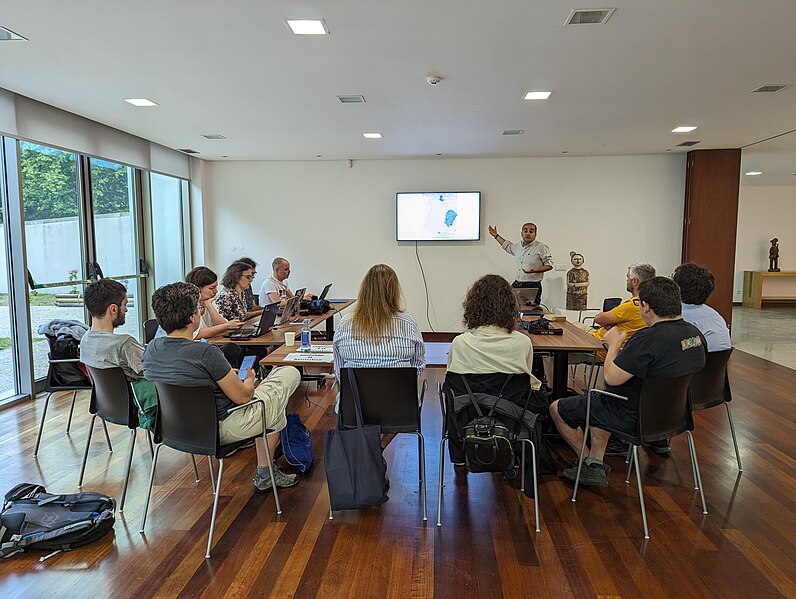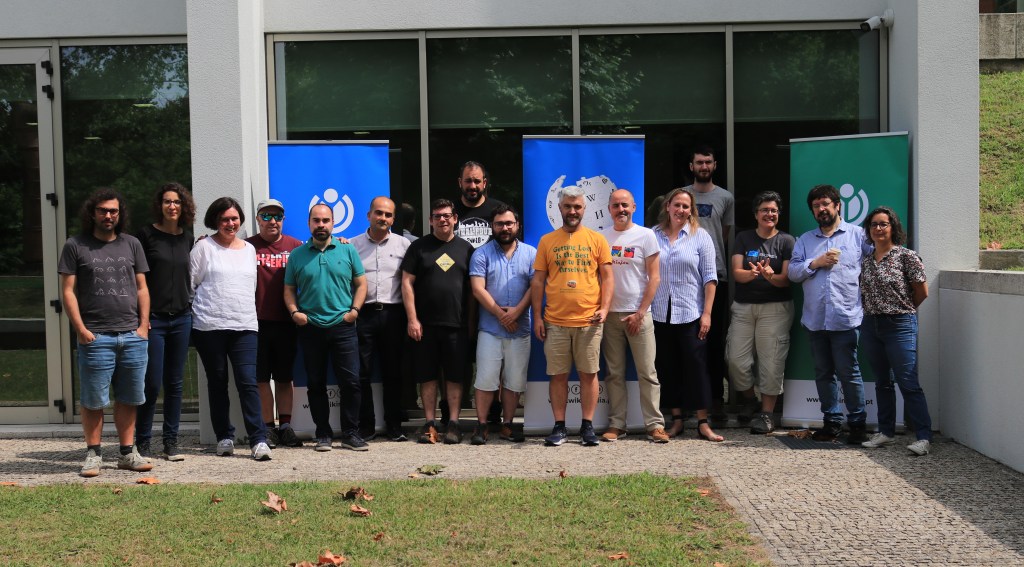Porto Meeting 2023, a meeting of Wikimedian communities in minority and minoritised languages, took place from 16 to 18 June 2023. It was held in Porto, at the Faculty of Letters of the University of Porto and the Pernambuco Institute, and was jointly organised by Wikimedia Portugal (WMPT), Wikimedia Spain (WMES), Wikimedia Italy (WMIT), CODA-Centre for Digital Culture and Innovation, and the Faculty of Letters of the University of Porto (FLUP).
During the event, 27 participants, both from academia and Wikimedia, and representing ten linguistic communities -Asturian, Catalan, Spanish, Basque, Extremaduran, Italian, Galician, Mirandese, Lombard and Portuguese- shared their experiences, achievements, difficulties and challenges in promoting linguistic diversity in Wikimedia projects. The space was an opportunity to network and explore ways to join forces for the future.
How it started
The idea for this meeting came from a conversation at the Wikimedia Conference 2017, from which a group of Wikimedians from different communities proposed a meeting in Porto around the minority languages of several European countries. The event was scheduled for 16-18 November 2018, but for various reasons it could not take place.
In November 2022, during the IX Wikimedia Spain Conference in Almeria, several people from Wikimedia Spain and Wikimedia Portugal talked about the organisation of joint projects, the possibility of a cross-border meeting and how to support the Wikipedia communities in Mirandese and Extremaduran. In this context, the Porto Meeting proposal was rescued, and both Wikimedia Portugal and Wikimedia Spain agreed to go ahead with the organisation of a meeting that would allow the building of alliances between different Wikimedia communities. Subsequently, during Iberoconf 2023 in Bogotá, this proposal was shared with Wikimedia Italy, who joined the organisation of the meeting.
All the work of organising the meeting was shared between the three chapters through a team of six people, and all expenses, including accommodation, transport and meals, were covered by contributions from the three organisations.
Program
Over the three days, the program included 22 sessions of roundtables, presentations, workshops and discussions. The first day focused on the academic aspect of minority and minoritised languages, while the other two days were devoted to Wikipedia and its sister projects.
During the first day, after the institutional welcome, the attendees were able to learn about different aspects of the most emblematic Wikimedia projects, such as Wikipedia, Wikidata or Commons, and their possibilities for minority languages. This was followed by a roundtable with speakers from the University of Porto, in which different aspects affecting these languages were discussed, such as the lack of recognition and prestige, the invisibility of their speakers, or the importance of their preservation as a way of conserving the legacy of our ancestors.
The afternoon continued with projects on the preservation of minority languages by the Centro Interdisciplinar de Documentação Linguística e Social (CIDLeS); their importance as part of our identity, the need to consider and plan for the future or suggestions for carrying out such projects. The day ended with three sessions on Mirandese, Asturian and the languages of Extremadura, in which the history of each language, the milestones of their preservation, as well as their current situation and prospects for the future were presented.
The second day began with five presentations in which representatives of Wikipedia in Asturian, Catalan, Basque, Extremaduran and Galician gave an overview of the history of the project, the problems they face, the relationship with institutions, the state of their community, or projects they are carrying out or have carried out. In relation to Wikidata, we had a workshop on how to include lexicographic data, its importance, and the subsequent applications that can benefit from this content.
This was followed by a session on Language Diversity Hub, in which for example problems affecting the representation of Africa’s linguistic diversity on Wikipedia, such as internet connectivity, with fewer possibilities to contribute to Wikipedia, or the lack of digital skills, were presented. From Italy, we learned about a collaboration between Wikimedia Italia and the Department of Literature and Foreign Languages at the University of Verona, through which they organised several wiki labs with students, involving the translation of content between different languages. Finally, we learned about the series of thematic editathons on the Catalan language -later extended to other topics- that have been organised on Catalan Wikipedia since 2013.
On the third and last day, we started with another session on Mirandese, followed by two presentations on the state of Wikipedia in Mirandese and Lombard, as well as in the other regional languages of Italy, with their current situation and the common problems they face. This was followed by an overview of the different actions that Wikimedia Spain has carried out/supported in favour of linguistic diversity, including meetings, editathons or merchandising.
Future
The last session of the third day was devoted to talking about the meeting itself and what future prospects we saw after this first step. The reception among the participants was outstanding, and they pointed out how it has served to share and generate projects and initiatives, to learn from others, and to work for the dynamisation and visibility of minority and minoritised languages, and they valued the mixture of languages, because in our wikimedian experience, this event has been the first in which each person has been able to speak in their own language and be understood, except for Basque.
For all these reasons, the various communities expressed their interest in continuing to share experiences virtually and in person, so that joint strategies can be devised to respond to needs, share resources and learn together.

Can you help us translate this article?
In order for this article to reach as many people as possible we would like your help. Can you translate this article to get the message out?
Start translation

